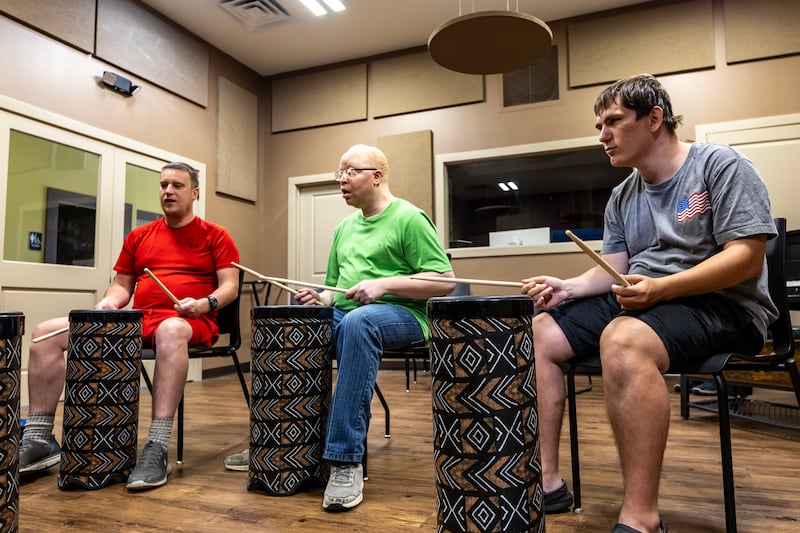“Mind-boggling” is what Art Dykstra, former executive director of Trinity Services in New Lenox, called the nonprofit’s 75 years of accomplishments in the fields of developmental disabilities and behavioral health.
“The founders in the 1950s did an amazing job of putting an organization together,” Dykstra said. “And those who drink the water must remember who dug the well. ... We’ve had some tough times. But it’s truly been a blessing.”
On Sept. 18, Trinity Services will celebrate its 75th anniversary at its 36th annual Better Together Dinner Dance and Auction. Tickets are $125 each, and the registration deadline is Sept. 12.
The event, which takes place at 6 p.m. at DiNolfo’s in Homer Glen, will include fine dining, dancing, and silent and live auctions. The fundraiser benefits people with developmental disabilities and mental illness who receive support from Trinity.
Foundation in education
Dykstra, now board chair of the Trinity Foundation, said Trinity Services began in 1950, when a group of parents started a school for their children who had developmental disabilities and no options for education.
:quality(70)/cloudfront-us-east-1.images.arcpublishing.com/shawmedia/H5WXKBYUIRBEZJAURFZNG5XU7U.jpg)
In 1959, the Exchange Club of Joliet, using volunteers and donated materials, constructed “a modern school building” at 100 N. Gougar Road in Joliet, according to the website.
Students learned “homemaking and basic academic and social skills.” Teachers focused on the mental, emotional and physical needs of their students, according to the website.
Trinity Services still operates its school, community day program and residential programs, including group homes, the first of which opened in 1989. Petals & Twigs gift shop in New Lenox, a Trinity support business, opened in 1988 and is still operating.
When Trinity Services hired Dykstra as president and CEO in 1987, Trinity had a budget of $500,000, and 33 employees operated just two programs: the school and a developmental training center.
:quality(70)/cloudfront-us-east-1.images.arcpublishing.com/shawmedia/GAQL7BYRHVFFPBT57UFACR27ZY.jpg)
When Dykstra retired in 2017, Trinity Services had become a statewide organization with 1,200 employees and a $56 million budget to operate 12 major programs, which included programs for people with mental illnesses, children and adult with developmental disabilities, and individuals on the autism spectrum.
But Trinity Services has added other services through the years, including programs for mental health and resources for people experiencing homelessness.
“I think a leader has to spend at least a third of the time worrying about the future,” Dykstra said in 2017. “Just putting out fires makes for an unhealthy organization.”
Trinity’s horticulture program began in the 1990s at Trinity’s fully accessible greenhouse and outdoor garden space in Joliet. Participating in the program helps “develop social skills, improve motor coordination, enhance self-esteem and acquire job skills,” according to the Trinity Services website.
In 2013, Trinity moved into its new corporate center at 301 Veterans Parkway in New Lenox.
Leadership change, expansion
Dykstra’s son, Thane Dykstra, joined Trinity in 1995 as clinic director of Trinity’s Behavioral Health Network. Thane Dykstra served as Trinity’s chief operating officer from 2016 to 2017 and has served as president and chief executive officer since 2018.
“I just have real passion for supporting people most providers aren’t interested in serving or who don’t necessarily have the expertise in serving,” Thane Dykstra told The Herald-News in 2017.
Other Trinity staff apparently reflect that same passion.
For instance, 120 of Trinity’s direct support professionals volunteered to shelter in place with their clients until the stay-at-home order ended during the early days of the COVID-19 pandemic.
The goal was to ensure continuity of care while keeping clients safe by cutting down on the number of people going in and out of each group home.
The Illinois Department of Human Services in 2021 worked with Trinity Services and partner organizations to offer four COVID-19 vaccination clinics for people with developmental disabilities and workers who support them, vaccinating about 700 people in all, Thane Dykstra estimated in 2021.
In 2021, Trinity opened a Living Room in Orland Park, which is part of the Illinois Department of Human Services’ Division of Mental Health Living Room Program.
In 2022, Trinity Services opened Prairie Trail at the Landings in New Lenox, a housing community of 22 one-bedroom and three-bedroom units for adults with disabilities.
:quality(70)/cloudfront-us-east-1.images.arcpublishing.com/shawmedia/TBXNIT7URFCQJEO4OIP4RQOT7I.jpg)
Trinity Services staff support residents in various ways: budgeting, cooking, job counseling, medication, social skills and transportation.
Also in 2022, Trinity Services opened Studio 22, a community day services program located in a converted 10,000-square-foot warehouse in New Lenox for clients age 30 and older.
:quality(70)/cloudfront-us-east-1.images.arcpublishing.com/shawmedia/QVB2RUWGLZGQ3JCJDYADYGAAI4.jpg)
Trinity Services bought the community health center building at 2000 Glenwood Ave. in Joliet about 18 months ago and began moving some services – such as The Living Room – into the building as early as May 2024, Hassan said in March, when Trinity Services opened a Community Health Center.
The Joliet Living Room opened in 2024 to offer 24/7 emergency mental health services.
:quality(70)/cloudfront-us-east-1.images.arcpublishing.com/shawmedia/23TQWBIZI5G7ZMURKBUVJJBAEA.JPG)
Quality must accompany growth, and “it’s harder to be on top of that quality when you have the scope and scale that we do today,” Thane Dykstra said. “For me, and I think for our leadership team, being very mindful of that quality really matters.”
But the ultimate strength of Trinity Services is its staff and the relationships they form with each other and Trinity clients, he said.
“I think that is what accounts for our success and growth,” Thane Dykstra said.
For a complete history of Trinity Services, visit trinityservices.org.

:quality(70)/s3.amazonaws.com/arc-authors/shawmedia/59304215-cb18-46db-bced-9941d9413236.jpg)